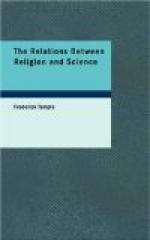The regularity of nature is the first postulate of Science; but it requires the very slightest observation to show us that, along with this regularity, there exists a vast irregularity which Science can only deal with by exclusion from its province. The world as we see it is full of changes; and these changes when patiently and perseveringly examined are found to be subject to invariable or almost invariable laws. But the things themselves which thus change are as multifarious as the changes which they undergo. They vary infinitely in quantity, in qualities, in arrangement throughout space, possibly in arrangement throughout time. Take a single substance such, say, as gold. How much gold there is in the whole universe, and where it is situated, we not only have no knowledge, but can hardly be said to be on the way to have knowledge. Why its qualities are what they are, and why it alone possesses all these qualities; how long it has existed, and how long it will continue to exist, these questions we are unable to answer. The existence of the many forms of matter, the properties of each form, the distribution of each: all this Science must in the last resort assume.
But I say in the last resort. For it is possible, and Science soon makes it evident that it is true, that some forms of matter grow out of other forms. There are endless combinations. And the growth of new out of old forms is of necessity a sequence, and falls under the law of invariability of sequences, and becomes the subject-matter of Science. As in each separate case Science asserts each event of to-day to have followed by a law of invariable sequence on the events of yesterday; the earth has reached the precise point in its orbit now which was determined by the law of gravitation as applied to its motion at the point which it reached a moment ago; the weather of the present hour has come by meteorological laws out of the weather of the last hour; the crops and the flocks now found on the surface of the habitable earth are the necessary outcome of preceding harvests and preceding flocks and of all that has been done to maintain and increase them; so, too, if we look at the universe as a whole, the present condition of that whole is, if the scientific postulate of invariable sequence be admitted, and in as far as it is admitted, the necessary outcome of its former condition; and all the various forms of matter, whether living or inanimate, must for the same reason and with the same limitation be the necessary outcome of preceding forms of matter. This is the foundation of the doctrine of Evolution.




